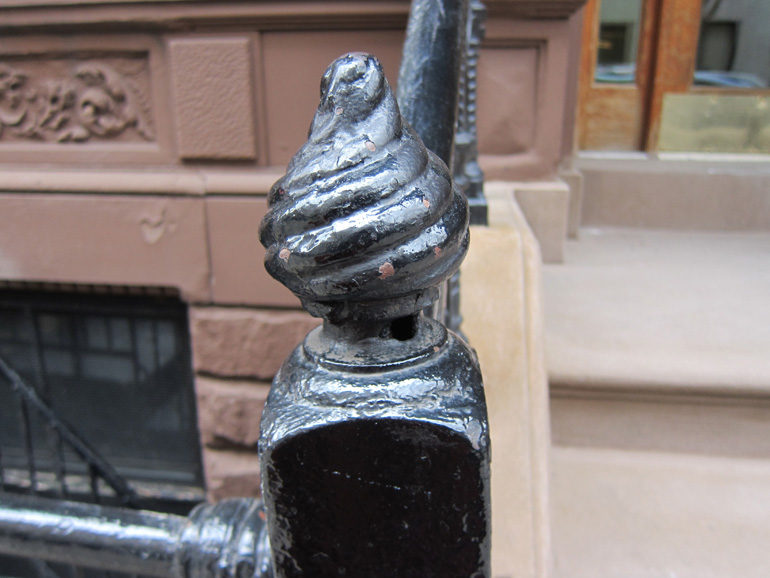Gotham Diary:
“It would be a privilege to live here.”
8 February 2012
Here is a quick example of Edward St Aubyn’s magnificent prose style.
As a guest, Emily Price had three main drawbacks: she was incapable of saying please, incapable of saying thank you and incapable of saying sorry, all the while creating a surge in the demand for these expressions.
As a piece of English-language architecture, it’s as magnifcent as any country house (a house in town would be more severely punctuated, with quotes around the expressions and a colon after “sorry”), but it is also a clarion call for attentive decency (our favorite subject). Emily Price is a lout, which is unusual in a woman and therefore remarkable. With a man as its subject, the statement wouldn’t be as funny — but the surge wouldn’t be as extreme, either.
It’s his decency that redeems Patrick Melrose, that makes his miserable lapses into drug and drink abuse easy to overlook, at least when Patrick is not actually falling down or, more likely, lighting the fuse on a highly volatile situation. It’s his decency that makes him an interesting man, and not just the victim of beastly parents. (You’d think that his father, what with raping him for three years, would win the worst-parent laurels, but his mother’s incompetence as a human being makes his father’s wickedness seem ornamental.)
I spent an hour or so yesterday reading up on St Aubyn, who indeed, as one feared from various reviews, has drawn the Melrose saga from his own personal history. I managed to order copies of the two novels that he wrote in between Some Hope and Mother’s Milk; by the time they arrive, I’ll have finished At Last, which is, currently at least, the final Melrose novel. I wouldn’t be so sure. St Aubyn thought that he was through with Melrose after Some Hope; indeed, that’s the title given to an omnibus edition of the three Melrose novels that St Aubyn wrote before writing On the Edge and A Clue to the Exit, his two non-Melrose books. He wrote Mother’s Milk about a man called Mark something, but eventually realized that he was simplty continuing Patrick’s story. (He has a funny story to tell about what happened when he instructed his word processor to make the global change in names; a moment’s thought — aided by rueful experience — will probably tell it to you.) Now we have At Last, which begins (and, for all I know, ends) with Patrick’s mother’s funeral.
The Melrose novels may be the world’s longest suicide note, as well as (so far) an unsuccessful one. They constitute a letter written by a man who intends to take his own life, but who falls under the spell of his own writing. Not that you should imagine an attractive enchantment; one interviewer elicited from St Aubyn the confession that he wrote most of the first three books bare-chested, with a towel around his waist to soak up the sweat that poured out of him as he confessed his ghastly family secrets. (I don’t think that I could write very well under such conditions, but there you are — I’m no artist.) St Aubyn did indeed want to kill himself, and try to kill himself, but was saved by a rapture with the myth of Sisyphus. (Camus’s tract is mentioned early on in Bad News.) He would deal with the only serious philosophical problem (whether to commit suicide) as a novelist, doing the two things that the best novelists do so well that it’s hard to tell them apart: animating vivid characters with assiduous writing. Stories are all very well, but they can’t be allowed to upstage or trip up the quadrille of personages and prose, and St Aubyn has a wonderfully ironic way of not telling stories by hoovering them into backflashes. (The bit about Emily Price, above, comes from such a passage; Mary Melrose, sitting in the crematorium, is remembering a disastrous vacation in Provence.) Â
I can sit here all day writing about these books — if I didn’t have a lunch date, that is — but it’s no use: writing about suicide notes is hardly going to fill up the tent. The only thing to do is to quote. From page 6 of the first novel, Never Mind.
When she had first met David twelve years ago, she had been fascinated by his looks. The expression that men feel entitled to wear when they stare out of a cold English drawing room onto their own land had grown stubborn over five centuries and perfected itself in David’s face.
 I really do believe that Jane Austen and Edward St Aubyn are in a class by themselves.
Update: “surge in THE demand”; corrected, after a painful Google search, on 16 February.

